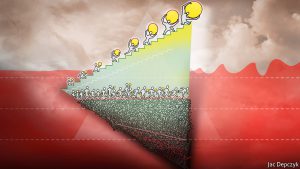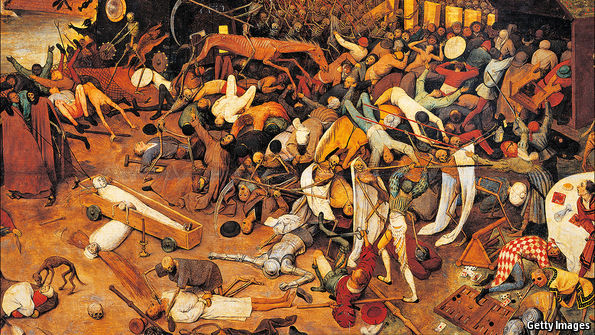Free exchange
A new anthology of essays reconsiders Thomas Piketty’s “Capital”
from The Economist

Thomas Piketty
Capital in the Twenty-First Century (2013)
– focuses on wealth and income inequality in Europe and the US since the 18th century.
– The central thesis is that inequality is not an accident but rather a feature of capitalism that can be reversed only through state intervention.
– argues that unless capitalism is reformed, the very democratic order will be threatened.
– reached number one on The New York Times bestselling hardcover nonfiction list from 18 May 2014.
– offers a possible remedy: a global tax on wealth.
The book’s central thesis is that when the rate of return on capital (r) is greater than the rate of economic growth (g) over the long term, the result is concentration of wealth, and this unequal distribution of wealth causes social and economic instability.
r > g: the rate of return on capital, r, has historically been greater than g, the growth rate of the economy.
Why does this matter?
1) the ratio of an economy’s wealth to its output tends to rise
=> which increases the relative economic power of wealth in society.
2) because the distribution of wealth is usually less equal than the distribution of income, faster growth in wealth than in GDP means a steady increase in inequality.
3) income from capital will grow as a share of income (and income from labour will fall).
So being born rich (or marrying well) becomes a surer route to success than working hard or starting a firm.
=> It is a recipe for social stagnation, and perhaps crisis.
Piketty proposes a global system of progressive wealth taxes to help reduce inequality and avoid the vast majority of wealth coming under the control of a tiny minority.
A trend towards higher inequality was reversed between 1930 and 1975 due to unique circumstances:
– the two world wars,
– the Great Depression
– a debt-fueled recession
=> destroyed much wealth owned by the elite.
=> prompted governments to undertake steps towards redistributing income (especially in the post-World War II period)
The fast, worldwide economic growth of that time
– reduced the importance of inherited wealth in the global economy.
The world today is returning towards “patrimonial capitalism”
– much of the economy is dominated by inherited wealth:
– the power of this economic class is increasing, threatening to create an oligarchy.
Piketty cites novels by
– Honoré de Balzac,
– Jane Austen
– Henry James
=> to describe the rigid class structure based on accumulated capital that existed in England and France in the early 1800s.
Piketty proposes that
– a progressive annual global wealth tax of up to 2%,
– combined with a progressive income tax reaching as high as 80%,
=> would reduce inequality,
=> “politically impossible”
Piketty predicts
– the growth rate will once again fall below the rate of return,
– the twentieth century will be an aberration in terms of inequality.
– Without tax adjustment, economic growth will be lower and inequality will be higher.
– over long periods of time, the average return on investment outpaces productivity-based income by a wide margin.
Piketty dismisses the idea that
– bursts of productivity resulting from technological advances can be relied on to return sustained economic growth;
– “a more just and rational order” to arise based on “caprices of technology,”
– return on investment can increase when technology can be substituted for people.
After Piketty: The Agenda for Economics and Inequality
edited by Heather Boushey, Bradford DeLong and Marshall Steinbaum
– a book by economists, for economists.
Piketty’s Capital lacks some points of view of:
– human capital
– technological change
– the structure of the firm
– the rise in outsourcing
– sexual inequality
– geography
Gareth Jones
– in “Capital” geographical divisions are treated as “container[s] for data”
– it should be treated as arenas with changeable boundaries within which the fight between labour and capital plays out.
Devesh Raval
– Economists think that as wealth accumulates, the return on capital should fall;
– society has less use for the hundredth factory or server than the first.
=> capitalists will seek new, profitable ways to deploy their wealth:
e.g. by investing in machines that can replace labour.
– If firms are good at using their capital to replace labour
(if the elasticity of substitution of capital for labour is greater than one)
then wealth can pile up.
If the return falls a lot as markets struggle to put capital into action,
1) r will decline towards g
2) the ratio of wealth to GDP will eventually stabilise.
=> the elasticity of substitution should be less than one == a well-behaved economy
It may not be.
Suresh Naidu
– a “domesticated Piketty”: communicates in the language of economics
– a “wild Piketty”: pays attention to social norms, political institutions and the exercise of raw power.
– r > g is not a theory to be disproved but a historical fact to be explained.
– the wealthy use their influence to shape laws and society in order to guarantee themselves a better return on their wealth.
The record of the past 40 years is suggestive.
– Top tax rates have fallen,
– financial regulation has weakened (at least before the crisis of 2007-08)
e.g. Dodd–Frank Wall Street Reform and Consumer Protection Act
– companies have found it easier to reduce their obligations to workers.
Economists often praise such moves as enhancing efficiency.
enhancement of efficiency == the wealthy seek to protect their returns at the expense of labour.
A focus on efficiency is unobjectionable in a world in which political and institutional stability can be taken for granted,
Elisabeth Jacobs
– Politics is “everywhere and nowhere” in Mr Piketty’s book
What “After Piketty” reveals
– the message lurking within all the undeveloped arguments in “Capital” about politics and ideology.
Economists should describe how capitalism works even when politics is changing.
It should be difficult but meaningful.
| 2017/05/27
| Finance & Economics, Summary
|
Apocalypse then
The lessons of violence and inequality through the ages
from The Economist

I picked up this article from the book review section of The Economist.
The book’s title is “The Great Leveler”
written by Walter Scheidel.
The main theme of this book is inequality.
In “The Great Leveler”, the author oddly welcomes the Great Depression because:
1) real wages risen; 実質賃金 < => nominal wages 名目賃金
2) the incomes of the affluent fallen
Great Depression 1929~
Great Recession 2007-08
Real wages are
– wages adjusted for inflation
– wages in terms of the amount of goods and services that can be bought.
This term is used in contrast to nominal wages or unadjusted wages.
a nominal wage is not adjusted for inflation.
If you’re paid $15.00 per hour, your nominal wage is $15.00 per hour
The author puts the discussion of increased inequality in works of Piketty, Atkinson & Milanovicinto a broad historical context
Thomas Piketty
Capital in the Twenty-First Century
It focuses on wealth and income inequality in Europe and the United States since the 18th century.
The book’s central thesis is that when the rate of return on capital (r) is greater than the rate of economic growth (g) over the long term, the result is concentration of wealth, and this unequal distribution of wealth causes social and economic instability.
r > g
Piketty proposes a global system of progressive wealth taxes to help reduce inequality and avoid the vast majority of wealth coming under the control of a tiny minority.
In The Great Leveler, the author finds that inequality is almost always high or rising because political and economic power help each other and both pass down generations
The author argues that
Large-scale levellings happens in some conditional situations.
1) epidemics;
the Black Death did when it changed the relative values of land and labour in late medieval Europe
2) the collapse of states and economic systems;
at the end of the Tang dynasty in China and the disintegration of the western Roman Empire
3) total revolution;
Russian or Chinese
4) the war of mass-mobilisation
the world wars
Violence is sometimes effective but does not lead to greater equality. Most popular unrest in history failed to equalise
Mass-mobilisation warfare was the cause of the unprecedented decrease in inequality. The deployment of national resources soaked the rich
There are some factors of Low inequality:
1) income tax (94% 1944 US);
2) property tax (77% 1941);
3) physical damage;
4) post-war inflations; decreases the value of properties of the riches
5) trade unions 労働組合
Following Max Weber, the sociologist, he thinks
democracy is a price elites pay for mass warfare
& finds it has no effect on inequality like classical Athens
democracy follows warfare
Catastrophic levellings like epidemics, revolutions & warfares will be less likely in our future anymore.
General prosperity risen.
Global inequality fallen
Attempts to ease inequality democratically through redistribution & the empowerment of labour can hardly change the trend & may prove futile (in vain, useless)
Other possibilities:
1) good, unknown transformation may come in the future, or AI may acquire its own will & change the trend
Humans need to rely on AI’s help.
We, humans, cannot help ourselves.
2) civilisational collapse might be worth paying for the Utopia.
by nuclear- or biotechnologically-mediated violence
like nuclear bombs / bioweapons
But the author doesn’t believe this possibility.
Because he concludes that, wealth may concentrate itself over time; the ability to destroy does not
| 2017/05/27
| Finance & Economics, Summary
|
The Buffetts of China
Warren Buffett has many fans in China but few true followers
from The Economist

Chinese Buffetts (Buffett-like investors) are now in trouble and face a stiff test because of its hard-driving, debt-laden, risky approaches & unstable cashflow.
The government appears at last to be serious about cleaning up financial markets.
Xi Jinping has declared that the focus of financial policy should be on limiting risks.
The banking regulators are now choking off cashflows to shadow banks.
The risk to Chinese investors:
1) political risk
– The state is closing in on those it suspects of illegality.
– 2 Chinese Buffetts are now in detention: jailed for manipulating the stockmarket & investigated for corruption.
2) financial risk
– In clamping down on debt, regulators’ targets are the debt-laden investments favoured by China’s insurance upstarts.
– Both Fosun and Anbang have had to call off foreign deals in the past year.
More Buffett-like companies are big, boring, and humble mainly state-owned insurers.
Hewing to official rules, they have been more cautious about using debt.
Benefiting from China’s growth, their performance has topped Berkshire Hathaway’s over the past decade.
| 2017/05/10
| Finance & Economics, Summary
|
Corporate ambitions
Amazon, the world’s most remarkable firm, is just getting started
from The Economist

Amazon, the former bookseller, is now a leading provider of cloud computing, TV programs and original physical products include Amazon Echo
Since 2015 its share price has jumped by 173%. It’s the fifth-most-valuable firm. But 92% of its value is due to profits expected after 2020
Investors anticipate a rise in sales from $136bn to $500bn (2016-17). It will have to grow faster than any company to justify its valuation
Microsoft has cloud-computing ambitions; Walmart has $500bn revenues & online services. All depends on Bezos. How can he achieve this goal?
Amazon’s unusual approach 1) time: Amazon is resolutely focused on the distant horizon. Mr Bezos emphasises two businesses: e-commerce & AWS
The more customers use Amazon’s services, the more Amazon can invest in new services: two-hour shipping; streaming video and music; Alexa
So long as shareholders retain their faith in this model, Amazon will be able to keep spending, which will keep making it more powerful
2) the breadth of activities: logistics; search engines; SNS; foods; all types of medias. Stockmarkets apply a “conglomerate discount”
Amazon could be a new kind of utility, providing the infrastructure of commerce: AWS; warehouse; air-freight; payment system; drone delivery
For now, Amazon is unlikely to attract the attention of regulators b/c US’s antitrust enforcers look at its effect on consumers & pricing
But Amazon may be accused of using its clout as a digital platform to extend its power to adjacent businesses like Google in Europe
If it become a utility for commerce, the calls will grow for it to be regulated as one, which will bring it into conflict with government

Amazon’s stock price (2001-2017)
| 2017/04/02
| Business, Summary
|






